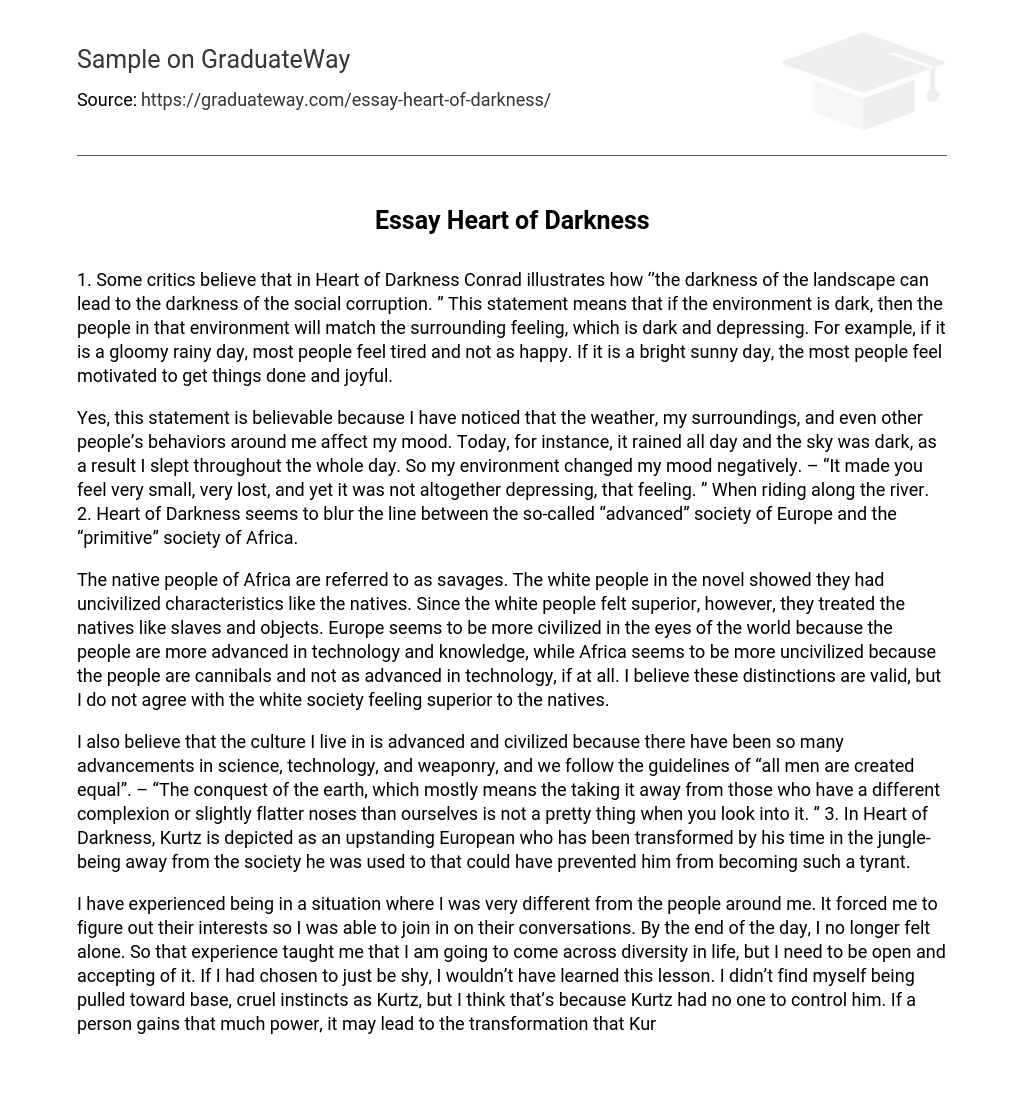According to some critics, Conrad depicts in Heart of Darkness that the darkness of the environment can lead to societal corruption. This suggests that if a place is bleak, its inhabitants will reflect the somber atmosphere, resulting in a feeling of darkness and desolation. For example, on a gloomy rainy day, people often feel tired and less satisfied. Conversely, on a sunny day, individuals are usually motivated to be productive and feel happy.
It is believable that my mood is affected by the weather, surroundings, and others’ behaviors. I have noticed that even a slight change in any of these factors can impact my emotions. For instance, today it rained all day and the sky was dark, leading me to feel down and lacking energy. This alteration in environment had a negative influence on my mood. In Heart of Darkness, Joseph Conrad explains how such changes can make one feel insignificant and disoriented but not necessarily completely depressed. Additionally, the novel highlights how it blurs the distinction between the supposedly advanced European society and the primitive African society.
The indigenous people of Africa are often labeled as savages. In the novel, the white characters displayed uncivilized traits similar to those of the natives. However, due to a sense of superiority, the white individuals treated the natives as slaves and objects. In the global perspective, Europe is considered more civilized because of its technological advancements and knowledge, whereas Africa is viewed as uncivilized due to cannibalism and limited technological progress, if any at all. I acknowledge the validity of these distinctions, but I disagree with the notion of white society feeling superior to the natives.
In my opinion, the culture I reside in is advanced and civilized because of the many advancements in science, technology, and weaponry. Moreover, we uphold the belief that “all men are created equal.” In Heart of Darkness, Kurtz is depicted as a respectable European who experiences a change while being isolated from his familiar society in the jungle. This transformation potentially contributes to his tyrannical actions.
Personally, I encountered a situation where I felt different from those around me. This compelled me to understand their interests in order to participate in conversations and not feel alone. It taught me the importance of being open and accepting of diversity. Unlike Kurtz, who transformed into a cruel and base individual due to lack of control, I did not undergo a similar change. However, excessive power can lead to drastic transformations like Kurtz experienced. On page 144 it is stated, “But his soul was mad…it had gone mad.” Kurtz’s last words, “The horror, the horror,” hold multiple meanings. In my interpretation, they symbolize the darkness brought about by his tyrant-like qualities during his time with the natives. He becomes increasingly greedy and ignorant while falsely believing he is superior.
In my opinion, the final words of Kurtz indicate that he was overwhelmed by the power he possessed and did not want to acknowledge it. The ambiguity of this scene, as created by Conrad, suggests that the “horror” that Kurtz embodied could be interpreted in various ways. This deliberate vagueness has a lasting impact on Marlow, as it becomes a part of his life. Additionally, it allows readers to contemplate their own interpretations of what the “horror” might signify. Some argue that Heart of Darkness is solely a political novella, while others believe it delves into the complexities of the human condition.
Yes, it is possible to interpret a work in various ways as I think this book addresses both political and human condition themes. The political and human condition aspects are interconnected. An example of this is Kurtz’s establishment of dictatorship (political) over the native people, which ultimately results in his descent into madness (human condition). When analyzing the story, readers should take into consideration the author’s intent as it will enable them to better comprehend the themes and symbols. Conrad’s intention in this narrative was to illustrate the dark and corrupt tendencies of a more advanced society upon an uncivilized society and how this leads to madness and chaos.
If the reader cannot comprehend the author’s intentions, it will become more challenging for them to grasp the story. Heart of Darkness may appear overwhelmingly somber and portray civilizations in an extremely unfavorable way to some readers. Personally, I found much of the novel to be gloomy and disheartening, but there were a few instances that shed a positive light. I observed that whenever the author discussed his childhood or youth, he always depicted them as cheerful and blissful. This suggests that everything appears uncomplicated in one’s youth, but as one grows older, life becomes more complicated.
On page 4, the narrator refers to two young boys who had “foolish and cheery countenances.” On page 71, he reminisces about his childhood and how the world appeared to him as “a blank space of delightful mystery – a white patch for a boy to dream gloriously over.” On page 126, he portrays a boyish-faced Russian as bright and “extremely gay.” The act of Marlow narrating his story is significant because it raises questions such as: Why is it important? How are women depicted in the novel, specifically the African mistress and Kurtz’s intended? Marlow’s decision to deceive Kurtz’s fiancee about his last words also begs the question of why he chose to lie. Can Kurtz be regarded as the “tragic hero” of the novel, with power serving as his downfall?





